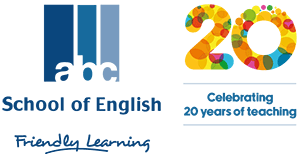Learning chunks of language

By Rachel Abbott ( ABC’s Academic Coordinator )Chunks of Language
Many language experts believe that grammar and vocabulary should not be seen as isolated parts of a language and some believe that grammar has less importance than vocabulary. Some approaches to language learning, such as Michael Lewis’ Lexical Approach, focus on the importance of putting vocabulary in the centre and believe that the largest bulk involved in learning a new language is the vocabulary and, more specifically, vocabulary chunks. In studies of language acquisition, the term chunk refers to several words that are customarily used together in a fixed expression, such as "inmy opinion," or "to cut a long story short." Also, known as language chunks, lexical chunks, lexical bundles, lexical phrases, and collocations. Why learn chunks of language?
According to research, our brains have not developed to remember isolated words. Neuroscience has found that our working memory has developed to remember short patterns of no more than four items at a time. It doesn’t matter how many individual words you memorise, without fitting the words into patterns, your brain will have trouble retrieving them when you really need to remember!
What’s the best way of learning language chunks?
Sometimes, chunks of language don’t make sense when you try to analyse the words separately, so a good way of learning language is through learning phrases. This includes learning phrasal verbs and collocations. Phrasal verbs are phrases that consist of a verb and one or two particles, usually prepositions. Examples of phrasal verbs are; look up, get into, get away with and walk away. A collocation is a familiar grouping of words which sound correct to people who have spoken the language all their lives. Examples of collocations with the verb ‘do’ are ‘do your best’ and ‘do yourhomework!’ When you read, see or hear a new phrasal verb in context try to understand the meaning from the situation. For example, if somebody says to you ‘Come on, we’re going to be late if you don’t hurry’, it is clear that ‘come on’ is being said to encourage you to do something quickly. You will be surprised at how much you can learn from context! When you come across collocations when reading or listening, you should try to be aware of them, especially those that are used more often. These are called common collocations. When you learn a new word, you should write down other words that collocate with it, e.g. take action, take a break, take turns, take a chance and revise what you learn on a regular basis. You should also try to practise using them in conversation soon after learning them. You could also try learning collocations by topic. For example, you could decide to learn all collocations associated with the topic of ‘weather’ one week and those connected with ‘fashion’ another week!
Why learn chunks of language?
According to research, our brains have not developed to remember isolated words. Neuroscience has found that our working memory has developed to remember short patterns of no more than four items at a time. It doesn’t matter how many individual words you memorise, without fitting the words into patterns, your brain will have trouble retrieving them when you really need to remember!
What’s the best way of learning language chunks?
Sometimes, chunks of language don’t make sense when you try to analyse the words separately, so a good way of learning language is through learning phrases. This includes learning phrasal verbs and collocations. Phrasal verbs are phrases that consist of a verb and one or two particles, usually prepositions. Examples of phrasal verbs are; look up, get into, get away with and walk away. A collocation is a familiar grouping of words which sound correct to people who have spoken the language all their lives. Examples of collocations with the verb ‘do’ are ‘do your best’ and ‘do yourhomework!’ When you read, see or hear a new phrasal verb in context try to understand the meaning from the situation. For example, if somebody says to you ‘Come on, we’re going to be late if you don’t hurry’, it is clear that ‘come on’ is being said to encourage you to do something quickly. You will be surprised at how much you can learn from context! When you come across collocations when reading or listening, you should try to be aware of them, especially those that are used more often. These are called common collocations. When you learn a new word, you should write down other words that collocate with it, e.g. take action, take a break, take turns, take a chance and revise what you learn on a regular basis. You should also try to practise using them in conversation soon after learning them. You could also try learning collocations by topic. For example, you could decide to learn all collocations associated with the topic of ‘weather’ one week and those connected with ‘fashion’ another week!
 What about longer phrases?
Some phrases are actually quite long and difficult to remember, for instance:
What was your favourite book when you were a child?
This contains more than the four items you are programmed to remember and is actually made up of a few chunks of language. The best thing to do is to learn bits at a time. You could learn ‘what was your favourite book?’ and then learn ‘when you were a child’ separately. These phrases both sound natural separated and you can mix and match them in various other contexts.
There are various ways of learning new chunks of language but remember that you need to practise using them in different contexts as soon as you can. You should also remember to have fun while you learn! Good luck!
What about longer phrases?
Some phrases are actually quite long and difficult to remember, for instance:
What was your favourite book when you were a child?
This contains more than the four items you are programmed to remember and is actually made up of a few chunks of language. The best thing to do is to learn bits at a time. You could learn ‘what was your favourite book?’ and then learn ‘when you were a child’ separately. These phrases both sound natural separated and you can mix and match them in various other contexts.
There are various ways of learning new chunks of language but remember that you need to practise using them in different contexts as soon as you can. You should also remember to have fun while you learn! Good luck!
 Why learn chunks of language?
According to research, our brains have not developed to remember isolated words. Neuroscience has found that our working memory has developed to remember short patterns of no more than four items at a time. It doesn’t matter how many individual words you memorise, without fitting the words into patterns, your brain will have trouble retrieving them when you really need to remember!
What’s the best way of learning language chunks?
Sometimes, chunks of language don’t make sense when you try to analyse the words separately, so a good way of learning language is through learning phrases. This includes learning phrasal verbs and collocations. Phrasal verbs are phrases that consist of a verb and one or two particles, usually prepositions. Examples of phrasal verbs are; look up, get into, get away with and walk away. A collocation is a familiar grouping of words which sound correct to people who have spoken the language all their lives. Examples of collocations with the verb ‘do’ are ‘do your best’ and ‘do yourhomework!’ When you read, see or hear a new phrasal verb in context try to understand the meaning from the situation. For example, if somebody says to you ‘Come on, we’re going to be late if you don’t hurry’, it is clear that ‘come on’ is being said to encourage you to do something quickly. You will be surprised at how much you can learn from context! When you come across collocations when reading or listening, you should try to be aware of them, especially those that are used more often. These are called common collocations. When you learn a new word, you should write down other words that collocate with it, e.g. take action, take a break, take turns, take a chance and revise what you learn on a regular basis. You should also try to practise using them in conversation soon after learning them. You could also try learning collocations by topic. For example, you could decide to learn all collocations associated with the topic of ‘weather’ one week and those connected with ‘fashion’ another week!
Why learn chunks of language?
According to research, our brains have not developed to remember isolated words. Neuroscience has found that our working memory has developed to remember short patterns of no more than four items at a time. It doesn’t matter how many individual words you memorise, without fitting the words into patterns, your brain will have trouble retrieving them when you really need to remember!
What’s the best way of learning language chunks?
Sometimes, chunks of language don’t make sense when you try to analyse the words separately, so a good way of learning language is through learning phrases. This includes learning phrasal verbs and collocations. Phrasal verbs are phrases that consist of a verb and one or two particles, usually prepositions. Examples of phrasal verbs are; look up, get into, get away with and walk away. A collocation is a familiar grouping of words which sound correct to people who have spoken the language all their lives. Examples of collocations with the verb ‘do’ are ‘do your best’ and ‘do yourhomework!’ When you read, see or hear a new phrasal verb in context try to understand the meaning from the situation. For example, if somebody says to you ‘Come on, we’re going to be late if you don’t hurry’, it is clear that ‘come on’ is being said to encourage you to do something quickly. You will be surprised at how much you can learn from context! When you come across collocations when reading or listening, you should try to be aware of them, especially those that are used more often. These are called common collocations. When you learn a new word, you should write down other words that collocate with it, e.g. take action, take a break, take turns, take a chance and revise what you learn on a regular basis. You should also try to practise using them in conversation soon after learning them. You could also try learning collocations by topic. For example, you could decide to learn all collocations associated with the topic of ‘weather’ one week and those connected with ‘fashion’ another week!
 What about longer phrases?
Some phrases are actually quite long and difficult to remember, for instance:
What was your favourite book when you were a child?
This contains more than the four items you are programmed to remember and is actually made up of a few chunks of language. The best thing to do is to learn bits at a time. You could learn ‘what was your favourite book?’ and then learn ‘when you were a child’ separately. These phrases both sound natural separated and you can mix and match them in various other contexts.
There are various ways of learning new chunks of language but remember that you need to practise using them in different contexts as soon as you can. You should also remember to have fun while you learn! Good luck!
What about longer phrases?
Some phrases are actually quite long and difficult to remember, for instance:
What was your favourite book when you were a child?
This contains more than the four items you are programmed to remember and is actually made up of a few chunks of language. The best thing to do is to learn bits at a time. You could learn ‘what was your favourite book?’ and then learn ‘when you were a child’ separately. These phrases both sound natural separated and you can mix and match them in various other contexts.
There are various ways of learning new chunks of language but remember that you need to practise using them in different contexts as soon as you can. You should also remember to have fun while you learn! Good luck!













